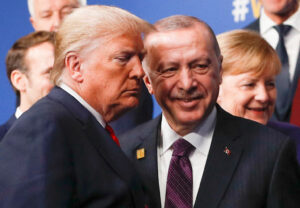Freshly-shaved, in a pressed shirt and exhibiting the merest hint of a pot-belly from all those kebabs on the go, Ekrem İmamoğlu, the mayor of Istanbul, knotted his blue tie while standing in his dressing room at home. “Hundreds of police have gathered at the door,” he told his supporters on social media, “but I will continue to fight ceaselessly against that person and against that mind which manipulates this whole process like a machine.” Then he stepped into the street and into custody. Thus, on 19 March, “that person”, President Recep Tayyip Erdoğan, precipitated Turkey’s current political crisis by having his main rival arrested on suspicion of corruption and supporting terrorism (let us dispense with any notion that the Turkish judiciary is independent).
Since then İmamoğlu’s party, the Republican People’s Party, or CHP, has held huge protest rallies across the country and staged a primary in which more than 15 million people anointed him as their candidate for the presidency. The opposition has also led a boycott of industrial conglomerates, media companies, and retail groups associated with the government, which has been patchily observed. On 2 April, many shops in Istanbul and elsewhere were shuttered in support of some 3,000 detained protesters. Such measures are clearly intended to spook investors and prompt a currency crisis of the kind that the Central Bank has already spent $25 billion in reserves to prevent. The interior minister deplored the opposition’s “assassination attempt on our national economy”.
The small number of independent Turkish journalists still able to work inside the country concur that the CHP, a fissiparous outfit with a talent for walking into political traps, has handled the crisis surprisingly well. Noting that İmamoğlu’s detention even brought protesters into the streets of Erdoğan’s hometown of Rize, on the Black Sea, one such commentator, Murat Yetkin, declared, “the wind is changing”.
Since Erdoğan embraced authoritarianism in the early 2010s, he and his AK Party, or AKP, have captured the judges, cowed the universities, and lobotomised the mainstream media. Rather than report on the biggest of the recent protests, by hundreds of thousands of Istanbullus (2.2 million according to the CHP), on 29 March, Turkey’s main news channel debated filo pastry recipes for the forthcoming Bayram holiday.
Erdoğan has a habit of revealing the outcome of judicial investigations before they conclude. Referring to a probe into what he called the “bribery, corruption and terrorism” of CHP municipalities, he predicted that “as it advances and deepens [it] will reveal how far the arms of the criminal organisation have embraced the municipalities like an octopus”. Depicting the protests as a Jacobin frenzy, and neglecting to mention the police’s use of tear gas, water cannons, and rubber bullets, he warned that such “street terror is nothing but an attempt to veil thefts” of which his opponents stand accused.
That the current agitation is both deep and wide testifies to Erdoğan’s declining credibility even among his constituency of Islamists, nationalists, and small businesses, which is corroborated by ever-slimmer electoral pickings. It also points to the emergence, finally, of a credible alternative to his suffocating misrule.
For years the CHP had struggled with the legacy of Kemal Atatürk, the founder of the Republic, who conceived of the party as an engine of Turkish nationalism, economic dirigisme, and prescriptive secularism. Erdoğan’s recent CHP opponents were either too nationalist to attract the Kurds, who make up around 18% of the population, or — as in the case of Kemal Kılıçdaroğlu, loser of the 2023 election — were disadvantaged by their membership of the Alevis, a big minority sect to which some Sunnis are axiomatically (and indefensibly) averse.
İmamoğlu, by contrast, is an observant Sunni with a background in the private sector — which Erdoğan supporters find reassuring. He possesses personal magnetism, a reputation for competence, and an instinct for the popular cause (milk for poor children; cleaning up the Golden Horn, for years a foul and dangerous suspension, now a place where dolphins cavort). To the Alevi and socially liberal base he inherited from Kılıçdaroğlu, he has added many Kurdish supporters. In a speech he delivered in the Kurdish region a few days before his incarceration (a 50-minute barnstormer with barely a glance at his notes), he referred to the Kurds as “the foundation stone, the central pillar of this country”. The emergence of the Kurds as a political force marks a big departure from the old nationalist insistence on a wholly Turkish nation. When I lived in Turkey as a journalist in the Nineties, CHP officials would deny the existence of the Kurds altogether, calling them “our brothers in the southeast” or, yet more egregiously, “mountain Turks”.
Of all the qualities that İmamoğlu needs as he begins a confinement that will either destroy him or make him invincible, the most salient is that he, alone among Erdoğan’s adversaries of the past quarter of a century, is a proven winner. In 2019 İmamoğlu was elected mayor of Istanbul, which had been a fiefdom of the AKP and its predecessor party ever since Erdoğan himself became mayor in 1994. The Supreme Election Council promptly annulled İmamoğlu’s victory and ordered a re-run only for indignant Istanbullus to return him with a bigger majority. In last year’s mayoral elections, he trounced his AKP opponent. As the saying goes — and as Erdoğan can confirm, having himself made the leap from mayor of Turkey’s biggest city to prime minister — “whoever wins Istanbul wins Turkey”.
When I interviewed a smiling Erdoğan in the spring of 1997 on the terrace of an Ottoman pleasure house, the then Istanbul mayor had a reputation for personal magnetism, competence, and an instinct for the popular cause (planting trees on Istanbul verges, piping water to the poor). In this sense, he and İmamoğlu have much in common — they even both hail from the Black Sea region. We were brought early strawberries which we ate while admiring the view over the Bosphorus. The word “democracy” came up often as we talked, even though the previous year Erdoğan had caused outrage by describing democracy as a tram: “it goes as far as we want it to go, and then we step off.”
Last month Turkish democracy ran out of track. Erdoğan’s decision to arrest his rival is a bet against his own experience. It was a jail sentence handed down by Turkey’s (then militantly secular) judiciary that propelled Erdoğan to national power in the first place. His crime in December 1997 was to recite a martial poem which the courts interpreted as an incitement to religious insurrection. The vindictiveness of the judgement turned him into a martyr while his mastery of the democratic discourse established him as a symbol of what Turkey’s Nato allies, searching frantically for unobjectionable Muslim regimes, referred to as “moderate” Islam. The US consul in Istanbul visited the mayoralty to commiserate; the case, she said, would “weaken confidence in Turkish democracy”. Erdoğan served four months in prison and in 2002 became prime minister, a post he subsequently abolished, creating the executive presidency he currently occupies.
The president does not intend to step down when his second term ends, in 2028, as the constitution decrees. Which brings us to another character integral to determining the outcome of the current crisis: Abdullah Öcalan, the imprisoned leader of the Kurdistan Workers’ Party, or PKK, which has waged an on-off war against the Turkish state since 1984. Erdoğan needs the help of Öcalan’s followers in parliament to enact constitutional changes that would allow him to run for a third term. The PKK is keen: its units have been hammered from the skies by Bayraktar drones manufactured by Erdoğan’s eponymous son-in-law, and its alliance with Syria’s Kurds has been imperilled by Turkey’s influence over the new government in Damascus, which it helped install. So it was a big moment when, on 27 February, after months of secret negotiations, Öcalan ordered the PKK to disarm and disband. Two days later the group’s commanders in northern Iraq announced a ceasefire.
A good deal for the Kurds would involve parole for Öcalan and a new Turkish constitution enshrining Kurdish cultural and political autonomy. But Amberin Zaman, perhaps the best-informed analyst of Kurdish affairs (and herself a courageous reporter who was driven out of Turkey by Erdoğan’s threats), believes that the president’s promises to Öcalan (made through intermediaries) amount to little more than an amelioration of his prison conditions and freedom for a prominent Kurdish politician. Nor have the Kurdish nationalists stayed silent during the current protests, with one of their parliamentary leaders denouncing İmamoğlu’s arrest as “a black stain” and “a blow against democracy and justice”.
Further blows will be landed. It is possible that Erdoğan will appoint an apparatchik to assume the government of Istanbul as he has done for municipalities whose Kurdish nationalist mayors have been removed or jailed. The loyal media will release details of alleged misdemeanours by the CHP, whose leaders are warning that the authorities will fabricate evidence using AI.
In a reign lasting almost a quarter of a century, Erdoğan has many precedents to draw on as he assaults the CHP. Back in 2016, a coup attempt by parts of the armed forces that had been infiltrated by devotees of Fethullah Gülen, an exiled cleric, was met with a huge purge not only of the army but also the bureaucracy, the universities and the media. Hundreds of thousands of people — not all of them Gülenists, by any means — were jailed, sacked, or forced into exile. To go by the accusations that the government has been levelling against the CHP, the party would be wise to brace for a similar total war.
Forget moderate Islam. Forget Turkish democracy. Erdoğan long ago flattened the secular judges and generals in his path and what he represents now is transactional geopolitics and power in perpetuity. Like the Ottoman sultans he admires — a favourite is Sultan Selim I, who almost tripled the empire’s size and committed what would nowadays be called a genocide against the Alevis — his vision is panoptic. He keeps his army, Nato’s second largest, busy fighting Kurds on both sides of the Syrian border. He opens the sluices and migrants flow into the EU; when the EU pays him enough he shuts them again. He pipes Russian natural gas into Europe for Vladimir Putin, while to Volodymyr Zelensky he sells Bayraktar drones that are used to kill Putin’s soldiers. Donald Trump likes him so much he let Turkey off with a 10% tariff and congratulated Erdoğan on doing “what no one’s been able to do in 2,000 years; you’ve taken over Syria”. The Russians call him “the plug for every barrel”.
This time around, don’t expect the US consul to come to the mayoralty to deplore the spectacle of a Democrat behind bars. Don’t expect Sir Keir Starmer to leap to the defence of a fellow Leftist who on the eve of his arrest was stripped of his university degree, rendering him ineligible to become president. Instead, think of Steve Witkoff, Trump’s special envoy to the Middle East, who crowed, “There’s just a lot of good, positive news coming out of Turkey right now.” For this isn’t the late Nineties. In its cells, its streets, this pro-democracy movement stands alone.
a.appcomments {
background: #FFF;
border: 1px solid #446c76 !important;
font-family: benton-sans,sans-serif;
font-weight: 600;
font-style: normal;
font-size: 12px;
color: #446c76 !important;
padding: 12px 50px;
text-transform: uppercase;
letter-spacing: 1.5px;
text-decoration: none;
width: 100%;
display: block;
text-align: center !important;
}



















